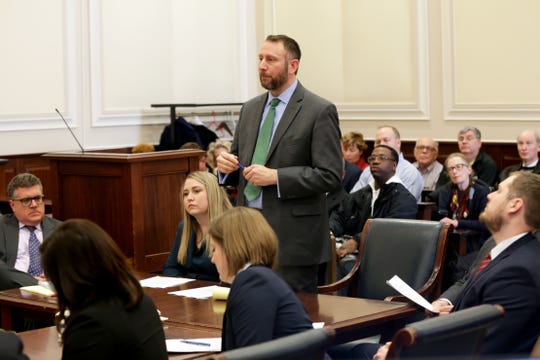Text messages and emails between hundreds of private citizens and Cincinnati City Council members known as the “Gang of Five” remain in the city’s possession and could be given to anyone – threatening the citizens’ right to privacy, a federal lawsuit says.
The texts and emails were collected as part of a battle over whether the five council members – in group text messages – had private discussions about city business that should have happened publicly.
In April 2018, a local resident represented by attorney Brian Shrive sued the five council members, all Democrats, saying they had violated Ohio’s open meetings law by holding “rogue” meetings in group text messages.
 (Photo: Kareem Elgazzar/The Enquirer)
(Photo: Kareem Elgazzar/The Enquirer) Attorney Brian Shrive, who along with his his client, activist Mark Miller, sought texts among Cincinnati City council members, addresses the court during a hearing for a proposed settlement in the lawsuit involving secret texts and email, Thursday, March 7, 2019, in Judge Robert Ruehlman’s courtroom in Cincinnati.
The texts surrounded how to push back against Mayor John Cranley’s attempt to oust former City Manager Harry Black.
The suit ultimately led Hamilton County Common Pleas Judge Robert Ruehlman in March to order the release of 10 months of text messages among the five council members: Tamaya Denard, Greg Landsman, Chris Seelbach, P.G. Sittenfeld and Wendell Young.
The city had hired a digital forensics company, Binary Intelligence, to create full digital copies of all the content on the five council members’ phones from Jan. 1, 2018 to Oct. 22, 2018.
According to the newly filed lawsuit, Shrive then filed a new public records request, seeking additional content from those cellphones, including communications from private individuals, not necessarily about city business. The city turned over text messages, emails, social media messages and other communication to Shrive, the lawsuit says.
The lawsuit, which seeks class-action status, was filed Monday in federal court in Cincinnati on behalf of two unnamed people, referred to as John Doe 1 and John Doe 2. They are described as being involved in Hamilton County Democratic party politics. It was filed by Jennifer Kinsley, a civil rights attorney and professor at Northern Kentucky University’s Chase College of Law.
U.S. District Judge Michael Barrett is being asked to issue an injunction prohibiting the city, Shrive and Binary Intelligence from keeping and disseminating the communications. The lawsuit also seeks unspecified monetary damages.
The city solicitor’s office declined to comment.
Shrive’s attorney, Curt Hartman, said the lawsuit is an attempt to prohibit openness, transparency and accountability.
Hartman questioned why the unnamed plaintiffs were going to federal court to fight a legitimate records request, made under state law.
“At the end of the day,” he said, “the plaintiffs are asking a federal court to rewrite state law.”
The lawsuit says communications between John Doe 1 and John Doe 2 were among those turned over to Shrive. It says topics included “purely social and friendly matters like parties, sporting events and neighborhood gatherings.” But also includes “matters of campaign strategy and political organizing protected by the First Amendment.”
The lawsuit says the city is likely to face additional public records requests for information from the cellphones. “The invasion of…privacy rights is therefore ongoing and potentially limitless,” it says.
Source: www.cincinnati.com





Be the first to comment on "Lawsuit: ‘Gang of Five’ Texts, Emails Threaten the Privacy of Hundreds of Citizens"